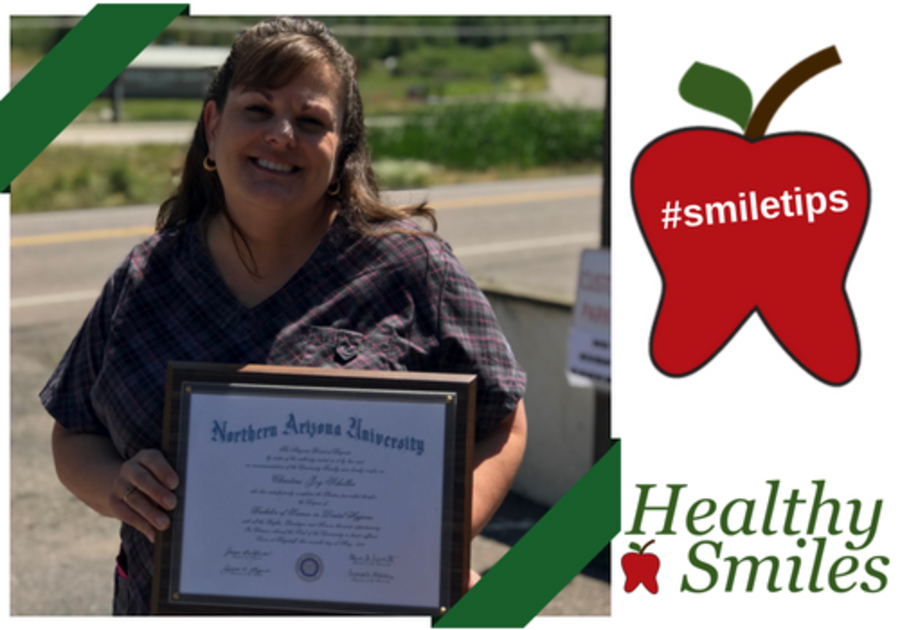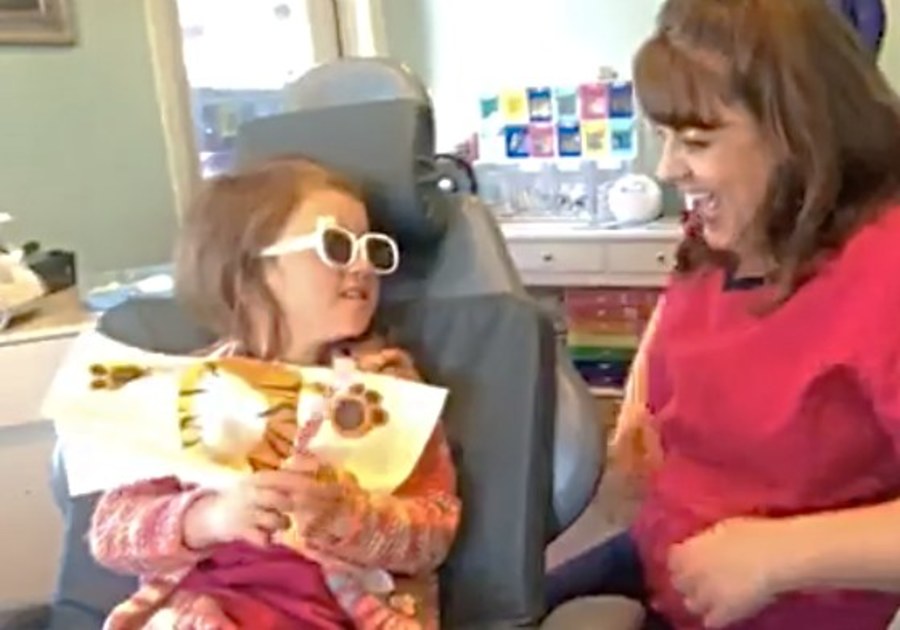Healthy teeth are important to your child’s overall health. They help your child eat and talk. Strong oral care helps set good dental habits as your child grows. Poor oral care can lead to infection, disease, or other teeth problems.
Help make dental hygiene fun with these tips:
- Let children help choose their own toothbrush. They can pick one that has a favorite color or character.
- Let children help choose toothpaste. They can pick their favorite flavor.
- Read books or watch videos that talk about dental hygiene.
- Use a timer to make sure kids brush their teeth for 2 minutes. Or play their favorite song to help keep track of time.
- Reward children for good oral care. Do not give them food or sugary treats. Offer something healthy or simple instead, like apple slices or a gold star.
- Plan a fun activity following your child’s dentist visit.
Path to improved health
The role of fluoride
Fluoride is important to your child’s dental health. It is known to reduce cavities in baby (primary) teeth and adult (permanent) teeth. It also helps make teeth strong by hardening the tooth enamel. Most children get fluoride in drinking water. Many cities are required to add fluoride to tap water. Water filters, such as Brita, do not remove fluoride and are okay to use. You should not use “reverse osmosis” water filters.
If your water does not contain fluoride, your child may need to take an oral fluoride supplement. Talk to your doctor to see if your child needs this. Once your child starts going to the dentist, they will get a fluoride varnish or cleaning on their teeth.
Too much fluoride can cause tooth stains and be harmful to your child’s health. Be sure your child does not swallow fluoride toothpaste or mouthwash. Follow all instructions for fluoride supplements.
Brushing and flossing
Dental hygiene should begin when your child is a baby. Start using a soft child-size toothbrush around the age of 1 or 2. You should brush your child’s teeth with water at least twice a day. You also can add a small dab of toothpaste that doesn’t have fluoride in it. This type of toothpaste is safe for your child to swallow. Once your child is old enough to spit out the toothpaste, you can switch to one that has fluoride. Only use a small amount. Teach your child to spread it among their teeth, gums, and tongue. Have your doctor or dentist show you the right way to brush your child’s teeth.
Your child likely will need help brushing their teeth until they are 7 or 8 years old. Around this time, they can start using a larger sized toothbrush. You should switch out toothbrushes every 3 to 6 months or when the bristles look worn. Children should brush their teeth for 2 minutes. Flossing is another key part of your child’s oral care routine. Teach your child to floss at least once a day. You can buy floss that comes on a handle to make it easier.
Cavities
Cavities are holes that form in your teeth. These can occur when bacteria (germs) build up in your mouth. Sugar in food and drinks turn into acid, which can eat away at your teeth. Cavities are common in children because their teeth can be harder to brush. Everyone in your family should take good care of their teeth. People who have cavities can pass the cavity-causing bacteria to unborn babies, infants, and children.
Your child may be at risk for cavities if they:
- have white spots or brown areas on their teeth
- have ongoing special health care needs
- do not go to the dentist often
- were born early (premature) or had a low birth weight.
Diet
Kids who eat a lot of sugary foods and drinks also are at high risk for cavities. It is important to make healthy food choices. Avoid too much sugar. Do not let your child have a lot of soda, fruit juice, or sweetened drinks. Limit sweet snacks and drinks between meals. If your child does have sugar, make sure they brush their teeth afterward.
Chewing gum is safe for older kids. It can provide benefits, such as:
- strengthening the jaw
- helping produce saliva
- washing away bits of food
- balancing acid that can cause tooth decay
- freshening breath.
However, gum that contains sugar can cause cavities. Limit the amount of sugar gum your child chews or only give them sugar-free gum.
Mouth safety
Safety is another big part of dental hygiene. If your child plays sports, they should wear a mouth guard. This is a soft, plastic retainer that covers the teeth and sometimes the lips. It helps protect your child’s mouth from injuries. Talk to your dentist if you need a custom-fit mouth guard.
From baby teeth to adult teeth
In general, baby teeth start to appear between 4 and 7 months old. The first teeth to come in are usually the 2 bottom front teeth. Most kids have all 20 baby teeth by about 3 years of age.
Children can lose their baby teeth as early as 6 years old and as late as 12 years old. During this process, your child has a mix of teeth as baby ones fall out and adult ones break through. Around this time, your dentist may talk to you and your child about possible teeth problems. Some kids need orthodontia treatment, such as braces. A full set of adult teeth is 32 teeth. This includes wisdom teeth, which most people do not get until their late teens or early adulthood.
When to see a doctor
The American Dental Association (ADA) recommends that children see a dentist around their first birthday. This gives the dentist a chance to look for early problems with your child’s teeth. Pediatric dentists specialize in treating children’s dental health. The dentist will talk to you about proper oral care.
Visiting a dental office from a young age will help your child be more comfortable. It also establishes the good habit of regular dental checkups. Everyone should get a dental check-up and cleaning twice a year.
Healthy Smiles - Making Kids Feel Comfortable at Every Visit!
Keeping our children’s teeth healthy and bright while having fun at the dental office is what we focus on at Healthy Smiles Hygiene. The kids get to be involved with their visit by choosing a pair of sun glasses to wear so the light is not so bright for their eyes, choosing an animal bib, tooth polishing paste flavor and polisher. I want kids to be able to touch and feel everything on their hands first before it goes into the mouth, so they are not afraid. I tell the kids the story of the Sugar Bugs so they know how cavities can form. The appointment ends with a smiling picture for the sparkle and shine door, choosing their favorite color of tooth brush and a visit to the treasure chest.
Book Your Appointment NOW!
Chrisy is a dedicated, energetic, detailed-oriented Registered Dental Hygienist with over 19 years of experience providing gentle and thorough dental treatment. Focused on exceptional patient comfort and care in oral hygiene treatment and emphasis on individualized preventative care management.
Healthy Smiles Dental Hygiene
Address: 25997 Conifer Rd
Conifer, CO 80433
Phone: (303) 838-7003
Website:
healthysmilesconifer.com
A Note to Our Readers - Your local Macaroni Kid website and newsletter is a FREE resource because of the businesses who sponsor our site. Our local businesses are what helps keep our community unique and thriving.
Readers often ask how they can support me as a small business owner. This is one thing you can do to help... we greatly appreciate your support in reviewing our sponsors' articles, advertisements, looking to our business directory to learn more about our beloved local businesses. Click on the ads and links - and if you decide to patronize these businesses, please be sure to let them know you heard about them from Macaroni Kid!
Thank you for reading and supporting our local businesses and Macaroni Kid!
 |
 |  | |||
 |  |  |






